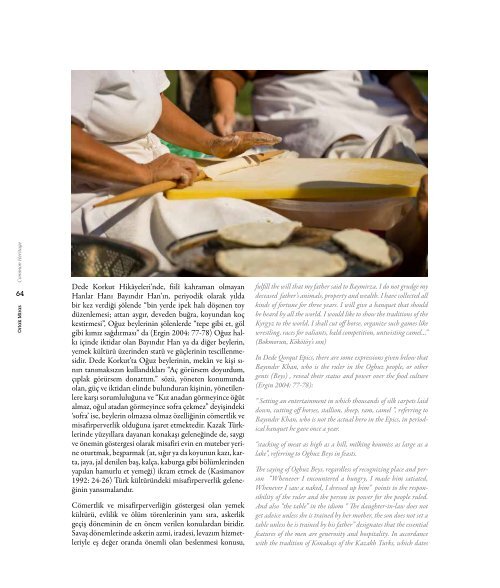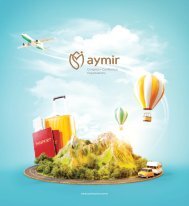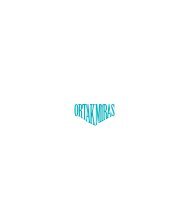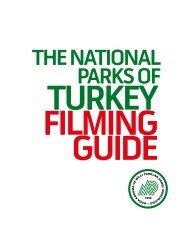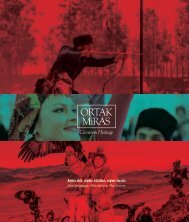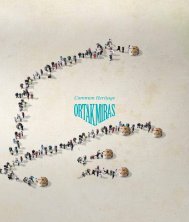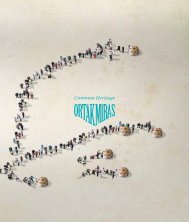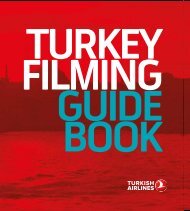- Page 2 and 3:
Medeniyet, insanlığın ortak mira
- Page 4 and 5:
Düğün Wedding 7 Beşeri İlişki
- Page 6 and 7:
Ortak Miras Common Heritage 6
- Page 8 and 9:
Common Heritage 8 Ortak Miras Kolek
- Page 10 and 11:
Ortak Miras Common Heritage 10
- Page 12 and 13:
Common Heritage 12 Ortak Miras Şem
- Page 14 and 15: Common Heritage 14 Ortak Miras urun
- Page 16 and 17: Vitas sum quasped quassintiae nos e
- Page 18 and 19: Common Heritage 18 Ortak Miras semb
- Page 20 and 21: Common Heritage 20 Ortak Miras öğ
- Page 22 and 23: Common Heritage 22 Ortak Miras aç
- Page 24 and 25: Common Heritage 24 Ortak Miras 1993
- Page 26 and 27: Common Heritage 26 Ortak Miras ğü
- Page 28 and 29: Common Heritage 28 Ortak Miras reni
- Page 30 and 31: Common Heritage 30 Ortak Miras laya
- Page 32 and 33: Common Heritage 32 Ortak Miras kabu
- Page 34 and 35: Common Heritage 34 Ortak Miras üst
- Page 36 and 37: Common Heritage 36 Ortak Miras lini
- Page 38 and 39: Ortak Miras Common Heritage 38
- Page 40 and 41: Common Heritage 40 Ortak Miras Osma
- Page 42 and 43: Common Heritage 42 Ortak Miras Sela
- Page 44 and 45: Common Heritage 44 Ortak Miras Vita
- Page 46 and 47: Common Heritage 46 Ortak Miras halk
- Page 48 and 49: Common Heritage 48 Ortak Miras gere
- Page 50 and 51: Common Heritage 50 Ortak Miras yük
- Page 52 and 53: Common Heritage 52 Ortak Miras “B
- Page 54 and 55: Ortak Miras Common Heritage 54
- Page 56 and 57: Common Heritage 56 Ortak Miras Balk
- Page 58 and 59: Ortak Miras Common Heritage 58
- Page 60 and 61: Common Heritage 60 Ortak Miras sal
- Page 62 and 63: Common Heritage 62 Ortak Miras doğ
- Page 66 and 67: Vitas sum quasped quassintiae nos e
- Page 68 and 69: Common Heritage 68 Ortak Miras kül
- Page 70 and 71: Common Heritage 70 Ortak Miras büs
- Page 73 and 74: Prof. Dr. Olcobay KARATEV 05 Toy,
- Page 75 and 76: day yetiştirdiklerini, ihtiyaçlar
- Page 77 and 78: “bıştak, aş” gibi sütten ha
- Page 79 and 80: olmaz” atasözümüzde olduğu gi
- Page 81 and 82: Vitas sum quasped quassintiae nos e
- Page 83 and 84: aharın sonuna kadar satılır. Bu
- Page 85 and 86: Tarım Toyları Agricultural Festiv
- Page 87 and 88: nin da coğrafi özellikleri bulunm
- Page 89 and 90: Prof. Dr. Metin EKİCİ Renkler, k
- Page 91 and 92: “renk” karşılığı kullanıl
- Page 93 and 94: 1. Ak (Beyaz): Bir renk adı olarak
- Page 95 and 96: Colors 95 Renkler Vitas sum quasped
- Page 97 and 98: tarafından da çok eski dönemden
- Page 99 and 100: Renkler Colors 99
- Page 101 and 102: Selcan Hatun)” tanımlaması, sav
- Page 103 and 104: tir. Yaşıl sözündeki “ş” s
- Page 105 and 106: sonrası artmış, eski Türk inan
- Page 107 and 108: Renkler Colors 107
- Page 109 and 110: öldürmeye çalışmaktadır. Bu k
- Page 111 and 112: 7. Diğer Renkler;Boz (Kır, Kül R
- Page 113 and 114: Turuncu da dilimize Farsça ve Arap
- Page 115 and 116:
Prof. Dr. Mustafa ARSLAN Kültür,
- Page 117 and 118:
cıların ortak değerlerini ve aid
- Page 119 and 120:
çaldık melamet tablını” dizel
- Page 121 and 122:
Müzik Music 121
- Page 123 and 124:
ir koç veya oğlak tulumunun boyun
- Page 125 and 126:
uhları kovmada faydalanılan bir a
- Page 127 and 128:
Müzik Music 127
- Page 129 and 130:
den oluşmakta ve iki telli anlamı
- Page 131 and 132:
Müzik Music 131
- Page 133 and 134:
arasında da yaygın olarak kullan
- Page 135 and 136:
Dr. Pınar KARATAŞ 08 Var olduğu
- Page 137 and 138:
Ev & Mimari House & Architecture 13
- Page 139 and 140:
örnekler bulunur. Ormanlık bazı
- Page 141 and 142:
Vitas sum quasped quassintiae nos e
- Page 143 and 144:
Ev & Mimari House & Architecture 14
- Page 145 and 146:
yer almaktadır. Ağaç, asma veya
- Page 147 and 148:
dir. Eski keçe evler, kara çadır
- Page 149 and 150:
Yüklük genel adının yanında ç
- Page 151 and 152:
liğini taşıması kapıların şe
- Page 153 and 154:
yüzyılların izlerini taşıyan p
- Page 155 and 156:
M.Muhtar KUTLU Doğayı anlamaya ç
- Page 157 and 158:
“On iki Hayvanlı Türk Takvimi
- Page 159 and 160:
devreleri, toplumun yaşamını pro
- Page 161 and 162:
Mevsimler Seasons 161
- Page 163 and 164:
temanın çatışması ekseninde ge
- Page 165 and 166:
lar ve göğün en yüce katına se
- Page 167 and 168:
tak kültürel mirası olarak bahar
- Page 169 and 170:
kırılmakta ve ilerleyen ya da bas
- Page 171 and 172:
Öğr.Gör.Dr. Ulanbek ALİMOV Avc
- Page 173 and 174:
olmaları birbirlerini beslemekte v
- Page 175 and 176:
Vitas sum quasped quassintiae nos e
- Page 177 and 178:
okçuluk İslamiyet’ten sonra ina
- Page 179 and 180:
Spor Sports 179
- Page 181 and 182:
yönetmek de oldukça güçtür. B
- Page 183 and 184:
mesi için Türk Dili Konuşan Ülk
- Page 185 and 186:
Doç. Dr. Fatma KOÇ - Doç. Dr. Em
- Page 187 and 188:
lerinin üzerinde biçimlendirdikle
- Page 189 and 190:
güzel gözüküp gözükmediği du
- Page 191 and 192:
Fot.1: Bilge Kağan a ait kağanlı
- Page 193 and 194:
kullanmışlardır (Esin 1959,160).
- Page 195 and 196:
Fot.9:Kırgız kadın başlığı
- Page 197 and 198:
lesine adaması gerekliliği ön pl
- Page 199 and 200:
Fot 13:Kırmızı giysili ve siyah
- Page 201 and 202:
Fot.16: Kırmızı gelin giyimi (Mi
- Page 203 and 204:
Fot.20:Levni Minyatür 18. Yüzyıl
- Page 205 and 206:
luk ve huzurun rengi olarak kullan
- Page 207 and 208:
ilen ve üzeri M.Ö. 26 yy. efsanel
- Page 209 and 210:
Fot.23: Anakara-Beypazarı kadın g
- Page 211 and 212:
nin bazen bütününün, bazen ise
- Page 213 and 214:
önce Çin’de pantolonun kullanı
- Page 215 and 216:
özellik ilk önce Güney Başkurdi
- Page 217 and 218:
ğeri ise kullanım amacıdır. Bi
- Page 219 and 220:
Eskişehir Valiliği Eskişehir 201
- Page 221 and 222:
Yayınları: Ankara. • Ögel, Bah
- Page 223 and 224:
Prof. Dr. Salahaddin BEKKİ 12 İns
- Page 225 and 226:
Türklerin değişik devir ve coğr
- Page 227 and 228:
kadın ocaklıların bakmasını ge
- Page 229 and 230:
ek ocağı, Kuduz ocağı, Kulak a
- Page 231 and 232:
yanı sıra çörek otu, göztaşı
- Page 233 and 234:
(Çavdar 1989: 83-88; Kumartaşlıo
- Page 235 and 236:
dan hastanın iki kaşının arası
- Page 237 and 238:
ürettikleri ilaçlar tanıdıklar
- Page 239 and 240:
nan her bir nesneden yararlanma yol
- Page 241 and 242:
• Kaçargitmez, Şengül, Soner Y
- Page 243 and 244:
Prof. Dr. Fuzuli BAYAT 13 Dünya ha
- Page 245 and 246:
tan’dan ötürü sevmek gereklili
- Page 247 and 248:
Sözlü Kültür Oral Literature 24
- Page 249 and 250:
Ben yanaram düni güni Bana seni g
- Page 251 and 252:
Vitas sum quasped quassintiae nos e
- Page 253 and 254:
işlemekten Allah’a sığınırı
- Page 255 and 256:
marifet nihayetinde kulu Hakk’a,
- Page 257 and 258:
Sözlü Kültür Oral Literature 25
- Page 259 and 260:
Divan şiirinde, tasavvuf edebiyat
- Page 261 and 262:
Sıradan insаnlаrın yеri kаnd
- Page 263 and 264:
ol demektir 30 . Hatta “fazl u ke
- Page 265 and 266:
na olan aşkıdır. Kâmil insan da
- Page 267 and 268:
Prof. Dr. Fikret TÜRKMEN 14 Türk
- Page 269 and 270:
teydi (Ülken, 193). Mitolojik doğ
- Page 271 and 272:
Gebe olduğu anlaşılan kadının
- Page 273 and 274:
Çocukla İlgili İnançlar Childre
- Page 275 and 276:
Bebek doğunca, bebeğin bütün v
- Page 277 and 278:
Çocukla İlgili İnançlar Childre
- Page 279 and 280:
denmesinin sebebi de bu inançtır.
- Page 281 and 282:
Günümüzde çocuğa ad verilirken
- Page 283 and 284:
Kırsal kesimde yürüyemeyen çocu
- Page 285 and 286:
Kim Allah’ı severse Versin Muham
- Page 287 and 288:
Mustafa AKSOY 15 Bir takım kültü
- Page 289 and 290:
ile basarlar 3 denmiştir. 19. yüz
- Page 291 and 292:
de kullanılmaktadır. Yukarıda da
- Page 293 and 294:
Damga ve Motif Stamps and Motif 293
- Page 295 and 296:
Sosyo-kültürel olaylar zannedilen
- Page 297 and 298:
a bakarak okuyabilsinler diye konur
- Page 299 and 300:
görmek mümkündür 25 . Sümer,
- Page 301 and 302:
Damga ve Motif Stamps and Motif 301
- Page 303 and 304:
zemeyi süslemek için kullanılmı
- Page 305 and 306:
öbürü ise, 1965 tarihlidir ve Tu
- Page 307 and 308:
Damga ve Motif Stamps and Motif 307
- Page 309 and 310:
Damga ve Motif Stamps and Motif 309
- Page 311 and 312:
Pervin ERGUN 16 Eski yaygın inanı
- Page 313 and 314:
düşmek” ise aileye bir acı gel
- Page 315 and 316:
için deniz kıyısındaki kayaya d
- Page 317 and 318:
tıldığı bölümde tekrar ortaya
- Page 319 and 320:
Fire and Hearth 319 Ateş ve Ocak n
- Page 321 and 322:
ta; ev sahipleri de içine hediyele
- Page 323 and 324:
Ateşin sonsuza dek yansın!” (Ve
- Page 325 and 326:
Vitas sum quasped quassintiae nos e
- Page 327 and 328:
ateşin alevinden çocuğa geçece
- Page 329 and 330:
Ateş ve Ocak Fire and Hearth 329
- Page 331 and 332:
Ateş ve Ocak Fire and Hearth 331
- Page 333 and 334:
ise daha çok güzün yapılmaktad
- Page 335 and 336:
Tanrı tarafından özel yaratıld
- Page 337 and 338:
geçici olarak dışlanması anlam
- Page 339 and 340:
tutkulu aşklar, onunla anlatılmak
- Page 341 and 342:
Prof. Dr. Nebi ÖZDEMİR 17 Kültü
- Page 343 and 344:
afsunları arasındaki benzerlikler
- Page 345 and 346:
Çocuk Oyunları Children’s Games
- Page 347 and 348:
masına neden olmaktadır. Kentler
- Page 349 and 350:
da yaşatılmaktadır. Bu oyun Tür
- Page 351 and 352:
azı tekerlemeler söyleyerek çağ
- Page 353 and 354:
Çocuk Oyunları Children’s Games
- Page 355 and 356:
may (Tomuk Atmak) vb.” oyunlar ç
- Page 357 and 358:
Çocuk Oyunları Children’s Games
- Page 359 and 360:
kalkar. Kavun takma adlı oyuncunun
- Page 361 and 362:
Bugün, oyun ve oyuncak endüstrisi
- Page 363 and 364:
Prof. Dr. Ali BORAN 18 Genelde sana
- Page 365 and 366:
teknikler ve uygulandıkları alanl
- Page 367 and 368:
Süsleme Sanatları Decorative Arts
- Page 369 and 370:
ğu bölgelerarası yeni bir denge,
- Page 371 and 372:
levhaların bazı yerleri sırlanm
- Page 373 and 374:
Süsleme Sanatları Decorative Arts
- Page 375 and 376:
Decorative Arts 375 Vitas sum quasp
- Page 377 and 378:
Selçukluların anıtlarını süsl
- Page 379 and 380:
yaprağı çıkar. Yan yapraklar, s
- Page 381 and 382:
gösterir. XIV-XV. yüzyıllarda ay
- Page 383 and 384:
umu pekiştirmiştir. Böylesi bir
- Page 385 and 386:
mekan süsleme unsuru olarak kullan
- Page 387 and 388:
Süsleme Sanatları Decorative Arts
- Page 389 and 390:
ması sonucu bu yapıtlar günümü
- Page 391 and 392:
ve Osmanlı eserlerinin yanında g
- Page 393 and 394:
Doç. Dr. Hikmet ATİK, Doç. Dr. M
- Page 395 and 396:
ortaya çıkmıştır. Allah kelam
- Page 397 and 398:
ir alettir. Eski dönemde mıstar,
- Page 399 and 400:
7. Kitabeler: Cami, medrese, tekke,
- Page 401 and 402:
Kitap Sanatları Book Arts 401
- Page 403 and 404:
Kitap Sanatları Book Arts 403
- Page 405 and 406:
ve sadece bir dikdörtgenle yapıla
- Page 407 and 408:
halde sayfa boşluğuna yatay olara
- Page 409 and 410:
nında, zümrüdüanka benzeri efsa
- Page 411 and 412:
araları küçük yıldızlarla sü
- Page 413 and 414:
kıymeti yüksek bir cilt çeşidid
- Page 415 and 416:
Prof. Dr. Nebi ÖZDEMİR Kültür e
- Page 417 and 418:
göçün etkisini ortaya koymaktad
- Page 419 and 420:
elikler hakkında da bilgiler vermi
- Page 421 and 422:
Gezinti Travel 421
- Page 423 and 424:
tadır. Atalar kültünün ardılı
- Page 425 and 426:
dığı bu etkinliklerde olumsuzluk
- Page 427 and 428:
ir taraftan insan ruhunu dinginleş
- Page 429 and 430:
Gezinti Travel 429
- Page 431 and 432:
Gezinti Travel 431
- Page 433:
mekte, genişletme ve görünür k
- Page 436 and 437:
Common Heritage 436 Ortak Miras Eğ
- Page 438 and 439:
Common Heritage 438 Ortak Miras gı
- Page 440 and 441:
Common Heritage 440 Ortak Miras rin
- Page 442 and 443:
Common Heritage 442 Ortak Miras li-
- Page 444 and 445:
Common Heritage 444 Ortak Miras yar
- Page 446 and 447:
Common Heritage 446 Ortak Miras kez
- Page 448 and 449:
Ortak Miras Common Heritage 448
- Page 450 and 451:
Common Heritage 450 Ortak Miras kö
- Page 453 and 454:
Prof. Dr. Ali DUYMAZ Tarihten gün
- Page 455 and 456:
münün gerçekleşmediği toplumsa
- Page 457 and 458:
zer bir şekilde iki kısımdır. K
- Page 459 and 460:
vakıf eserleriyle donatılan köy,
- Page 461 and 462:
Vakıf ve Vakıf Kültürü Foundat
- Page 463 and 464:
Anadolu Selçukluları devletinin d
- Page 465 and 466:
mülk ve malları vakfedebilirler.
- Page 467 and 468:
Osmanlı toplumunda kırsal alanlar
- Page 469 and 470:
Vakıf ve Vakıf Kültürü Foundat
- Page 471 and 472:
inalar, çoğu zaman imaret çevres
- Page 473:
yöneldiği, hatta meşru olmayan k
- Page 476 and 477:
Common Heritage 476 Ortak Miras Ort
- Page 478 and 479:
Common Heritage 478 Ortak Miras rin
- Page 480 and 481:
Common Heritage 480 Ortak Miras ç
- Page 482 and 483:
Ortak Miras Common Heritage 482
- Page 484 and 485:
Common Heritage 484 Ortak Miras li
- Page 486 and 487:
Common Heritage 486 Ortak Miras kı
- Page 488 and 489:
Ortak Miras Common Heritage 488
- Page 490 and 491:
Common Heritage 490 Ortak Miras ren
- Page 492 and 493:
Common Heritage 492 Ortak Miras ça
- Page 494 and 495:
Common Heritage 494 Ortak Miras kal
- Page 496 and 497:
Ortak Miras Common Heritage 496
- Page 498 and 499:
Common Heritage 498 Ortak Miras ren
- Page 500 and 501:
Common Heritage 500 Ortak Miras nat
- Page 503 and 504:
Dr. Şirin YILMAZ Bir toplumun kend
- Page 505 and 506:
leşik hayatın yoğunlukta olduğu
- Page 507 and 508:
Türkler’de Güzel Sanatlar Commo
- Page 509 and 510:
sun, Hoço, Beş Balık, Murtuk, Be
- Page 511 and 512:
düzenlemelerin bolca yer aldığı
- Page 513 and 514:
Türkler’de Güzel Sanatlar Commo
- Page 515 and 516:
ticari yol güzergâhları, Osmanl
- Page 517 and 518:
miştir. Anadolu’da taş işçili
- Page 519 and 520:
kısımlarına kabartma şekiller y
- Page 521 and 522:
Türkler’de Güzel Sanatlar Commo
- Page 523 and 524:
XVIII. yüzyıldaki Batılı sanat
- Page 525 and 526:
ına yer vermektedir. Sahnelerde ö
- Page 527:
ve hayata geçiren üstün bir mill
- Page 530 and 531:
Common Heritage 530 Ortak Miras İn
- Page 532 and 533:
Common Heritage 532 Ortak Miras Tar
- Page 534 and 535:
Common Heritage 534 Ortak Miras bir
- Page 536 and 537:
Common Heritage 536 Ortak Miras old
- Page 538 and 539:
Common Heritage 538 Ortak Miras Tü
- Page 540 and 541:
Prof. Dr. Ali DUYMAZ Bilge Yapım C
- Page 542 and 543:
Common Heritage 542 Ortak Miras Bat
- Page 544 and 545:
Common Heritage 544 Ortak Miras evr
- Page 546 and 547:
Ortak Miras Common Heritage 546
- Page 548 and 549:
Common Heritage 548 Ortak Miras nan
- Page 550 and 551:
Common Heritage 550 Ortak Miras ler
- Page 552 and 553:
Common Heritage 552 Ortak Miras ş
- Page 554 and 555:
Common Heritage 554 Ortak Miras ata
- Page 556 and 557:
Common Heritage 556 Ortak Miras zav


